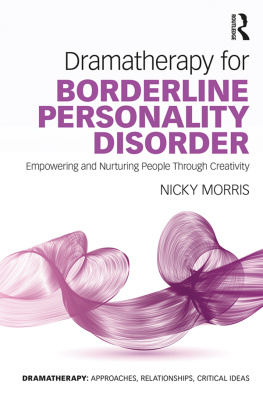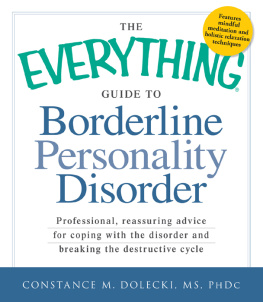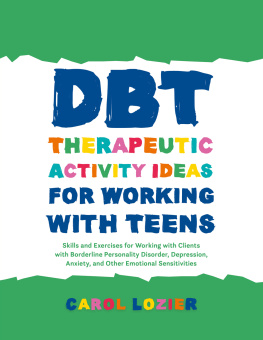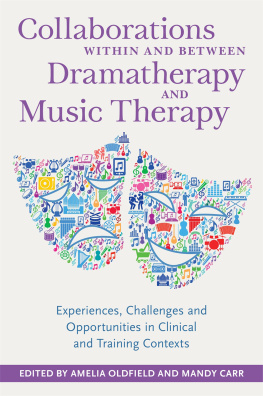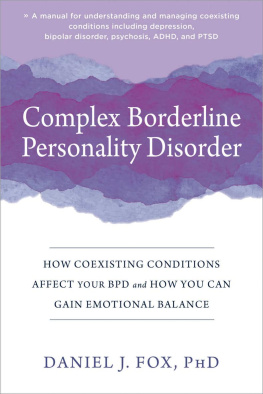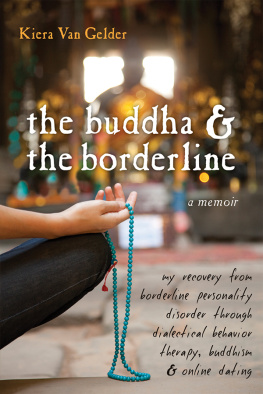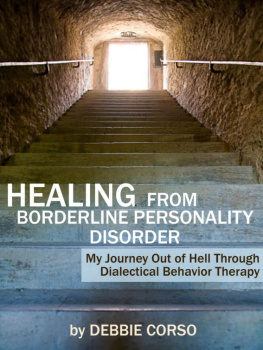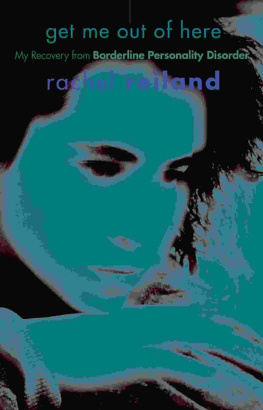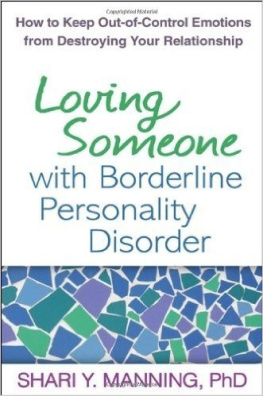First published 2018
by Routledge
2 Park Square, Milton Park, Abingdon, Oxon OX14 4RN
and by Routledge
711 Third Avenue, New York, NY 10017
Routledge is an imprint of the Taylor & Francis Group, an informa business
2018 Nicky Morris
The right of Nicky Morris to be identified as author of this work has been asserted by her in accordance with sections 77 and 78 of the Copyright, Designs and Patents Act 1988.
All rights reserved. No part of this book may be reprinted or reproduced or utilised in any form or by any electronic, mechanical, or other means, now known or hereafter invented, including photocopying and recording, or in any information storage or retrieval system, without permission in writing from the publishers.
Trademark notice: Product or corporate names may be trademarks or registered trademarks, and are used only for identification and explanation without intent to infringe.
British Library Cataloguing-in-Publication Data
A catalogue record for this book is available from the British Library
Library of Congress Cataloging-in-Publication Data
Names: Morris, Nicky, author.
Title: Dramatherapy for borderline personality disorder: empowering and
nurturing people through creativity / Nicky Morris.
Other titles: Dramatherapy (Series)
Description: Abingdon, Oxon; New York, NY: Routledge, 2018. |
Series: Dramatherapy | Includes bibliographical references and index.
Identifiers: LCCN 2018002571 | ISBN 9781138285903 (hardback: alk.
paper) | ISBN 9781138285910 (pbk.: alk. paper) |
ISBN 9781315210926 (ebk) | ISBN 9781351811132 (epub) |
ISBN 9781351811125 (mobipocket)
Subjects: MESH: Psychodrama | Borderline Personality Disordertherapy
Classification: LCC RC489.P7 | NLM WM 430.5.P8 |
DDC 616.89/1523dc23
LC record available at https://lccn.loc.gov/2018002571
ISBN: 978-1-138-28590-3 (hbk)
ISBN: 978-1-138-28591-0 (pbk)
ISBN: 978-1-315-21092-6 (ebk)
Typeset in Bembo
by Apex CoVantage, LLC

It is a privilege to write the foreword to this much-needed book.
There is no cure for borderline personality disorder and for years it was not considered treatable. This has been challenged in recent years and now NHS Choices (website), The Department of Health and National Institute for Health and Care Excellence guidelines recommend the implementation of arts therapies, including dramatherapy for BPD.
In this book Nicky Morris, a dramatherapist and expert in this field, recounts her work with this population of clients. Her ability to have enduring compassion and empathy for this often maligned group of people needed to be written about. As Nicky writes in the introduction to this book, They have suffered enough and this is a crucial part of the motivation for writing this book.
The book is the first of its kind to explore the use of dramatherapy in assisting those with BPD to find solace, to understand themselves further, and to find elements of peace and some meaning in their lives through creative expression. The clients pain is often expressed through maladjusted behaviour, including at times life-threatening self-harm. This pain that is so bonded with self means that change requires a new identity, which can be uniquely explored through dramatherapy to alter and incorporate new ways of being. Dramatherapy offers the possibility of finding meaning where the tussle between life and death is paramount, particularly through the exploration of story and myth. Self-harm, so often at the core of this disorder, has many reasons and effects but brutally reveals and communicates the pain and distress of the person. Nicky cites Kellogg and Young describing the life of a person with BPD as a kind of inner theater in which the forces of cruelty, rage, submission, and self-numbing each take their turn on the stage. Dramatherapy offers a space through the medium of drama and theatre to try out other ways of managing the trauma.
Other therapies used in the treatment of BPD are documented, together with the history of dramatherapy. The huge and very real impact on practitioners working with this client group and ways to manage the anxiety and maintain hope in the face of adversity are discussed. Self-harm and challenges to relationships through fear and mistrust can be very difficult for the therapist to withstand and Nicky writes of the struggle of practitioners working with these people who have experienced such depth of emotional pain how such valiant efforts can be met with recurring symptoms and subsequent lack of hope. Nicky does not shy away from exploring the grief so many of these clients have felt and feel and the reality of death in a population of people where one of ten completes suicide.
This book beautifully tells the story of Nickys work with these traumatised people and gives voice to those with BPD, incorporating poems and words from service users. This enormously important book is written by a dramatherapist, poet, actor and mother who meets her clients with her uniqueness as a human being and most of all her love.
Kate McCormack
Senior Dramatherapist at The Bethlem Royal Hospital
Dramatherapy: Approaches, Relationships, Critical Ideas
Series Editor: Dr Anna Seymour
This series brings together leading practitioners and researchers in the field of dramatherapy to explore the practices, thinking and evidence base for dramatherapy.
Each volume focuses on a particular aspect of dramatherapy practice, its application with a specific client group, an exploration of a particular methodology or approach or the relationship between dramatherapy and related field(s) of practice, all informed by ongoing critical analysis of existing and emergent theoretical ideas.
This series will be essential reading for trainee dramatherapists, arts practitioners and academic researchers engaged in multidisciplinary enquiry.
In this series:
Dramatherapy and Autism
Edited by Deborah Haythorne and Anna Seymour
Dramatherapy for Borderline Personality Disorder
Empowering and Nurturing People Through Creativity
Nicky Morris
For more information about this series, please visit: www.routledge.com/mentalhealth/series/DRAMA
Contents
by Kate McCormack
PART 1
Definitions, history, theory and treatment options
PART 2
Dramatherapy clinical case studies and vignettes
Guide
This book was inspired by the experience of working creatively with hundreds of women, struggling with internal demons and predominantly diagnosed with borderline personality disorder. During the past few years, whilst working towards the formation of this book, many of these women have been very supportive and were keen for their creative work, feedback and dramatherapy experiences to be included. Regarding more specific examples, numerous clients gave written consent. Their identities remain confidential throughout the text and they have all received pseudonyms, with no reference made to any locations or identifiable data.
There are ten colleagues I would like to thank for their contributions. Each took the time to complete detailed questionnaires and the first three offered further support and feedback: Georgia Ntzimani (occupational therapist), Preeti Gour (ward doctor) and Kevin Healy (ward consultant and medical director). Also, Margaret Gyasiaddo (social worker), Kosi Nojaduka (ward manager), Maria Bermeo (health care assistant and DBT therapist), Menat Abdoun (registered mental health nurse), Julie Johnson (assistant psychologist), Dina Vara (occupational therapist) and Sherlyne Howell (unit manager).

